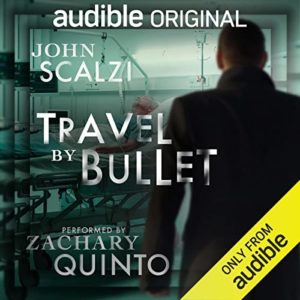 Travel by Bullet by John Scalzi
Travel by Bullet by John Scalzi Narrator: Zachary Quinto
Series: The Dispatcher #3
Published by Audible Originals on September 1, 2022
Source: Audible Plus
Genres: Mystery, Science Fiction
Length: 3 hrs 43 mins
Pages: 224
Format: Audiobook
Purchase at Amazon or Audible
Add on Goodreads

The world has changed. Now, when someone is murdered, they almost always come back to life—and there are professionals, called "dispatchers," who kill in order to save lives, to give those near the end a second chance. Tony Valdez is a dispatcher, and he has never been busier.
But for as much as the world has changed, some things have stayed the same. Greed, corruption and avarice are still in full swing. When Tony is called to a Chicago emergency room by an old friend and fellow dispatcher, he is suddenly and unwillingly thrown into a whirlpool of schemes and plots involving billions of dollars, with vast caches of wealth ranging from real estate to cryptocurrency up for grabs.
All Tony wants to do is keep his friend safe. But it’s hard to do when friends keep secrets, enemies offer seductive deals, and nothing is ever what it seems. The world has changed... but the stakes are still life and death.
The Dispatcher series is set in an alternative present world, except for unknown reasons starting a few years prior 99.9% of murder victims come back to life, their bodies reset to a few hours earlier, reappearing somewhere (usually their home) where they feel safe. Dispatchers are licensed to murder (dispatch) critically injured, dying people to save their lives.
This time around by saving a friend’s life, Tony ends up in a mess, as always. This time it revolves around shady cryptocurrency and a few ethically questionable billionaires. It’s a fun story, with a fast pace, snappy dialogue, and well-used humor. There were a couple of twists and turn I should have seen coming and Tony is very lucky to be on good terms with useful people.
Travel by Bullet does take place in post-pandemic Chicago which adds an interesting layer. With most books, I’d rather the pandemic be left out, but here Scalzi uses it well, both as it affects the dispatchers and how the constant mask-wearing can make it harder for police to identify people.
